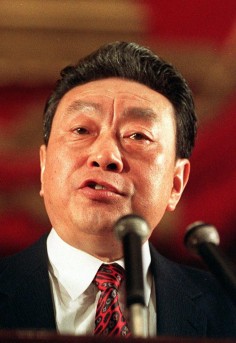
Death of Chen Xitong is retribution for his sins, says father of Tiananmen student victim
Father of student killed in the Tiananmen crackdown 24 years ago says death of former Beijing mayor Chen Xitong is punishment for his sins

The father of a student killed in the 1989 Tiananmen Square crackdown has described the death of former Beijing mayor Chen Xitong as retribution for the sins he committed 24 years ago, but said his demise would do nothing to change the official line on the bloody tragedy.
Wang Fandi, whose 19-year-old son Wang Nan was killed while taking photos on Changan Avenue on June 4, 1989, said that from an historical perspective, Chen had been only a tragic bit player in the crackdown.
"He was just a small potato and a tool manipulated by others," Wang said of the mayor who was one of the officials blamed for the military crackdown on the movement. "He just said and did what he was instructed to by people in the top echelon."
Wang, a renowned pipa expert, and his wife Zhang Xianling were supposed to arrive in Hong Kong from Beijing last week for a pipa musical contest on which he had been invited as an adviser.
But last week police visited them at their home and asked them not to visit the city, without giving a clear reason. "Chen's death won't have any bearing on whether Beijing's official verdict will be reversed," Wang said. "Li Peng [premier during the crackdown] and [former president] Jiang Zemin are the people who really make the difference."

His case and that of another convicted official - former Shanghai party chief Chen Liangyu - were the mainland's biggest political scandals before the drama that erupted last year over former Chongqing party boss Bo Xilai .
Political commentator Johnny Lau Yui-siu, who was sacked by pro-Beijing Wen Wei Po shortly after the 1989 crackdown, said he did not have any feelings about Chen's death as he was just a pawn during the incident.
Lau was one of the journalists and intellectuals Chen named in his report on the suppression of the 1989 movement for instigating the disturbances.
"His death won't have any impact in the political arena on the mainland," Lau said.
In the memoirs of late Communist Party general secretary Zhao Ziyang, the decision to use the military against peaceful protesters in Beijing's Tiananmen Square could have been avoided but for the scheming of die-hard conservatives such as Li, Chen and vice-premier Yao Yilin - and Deng Xiaoping's paranoia about losing power.
The memoir, entitled Prisoner of the State, was published in 2009.
In his conversations with mainland scholar Yao Jianfu, which hit bookstores in Hong Kong in May last year, Chen called the crackdown "a regrettable tragedy" that could have been avoided and downplayed his role. The book based on conversations between Chen and Yao contains eight interviews conducted from early 2011.
Lee Cheuk-yan, chairman of the Alliance in Support of Patriotic Democratic Movements in China, said Chen "had tried to clear his name in his frail years, but we all know it was in vain, and history will not forget him."
Veteran China-watcher Ching Cheong, who resigned as deputy chief editor of Wen Wei Po a month after the crackdown, said Chen was just a marginal figure in the incident. "His death will only have minimal impact on Beijing's thinking on the incident."